Walking out the trash
Contributing to a world with trash-free trails
Hello again,
Did you try a nighttime or full moon walk yet? Hopefully you had a clear night and got to experience a familiar walk in a new way.
And in case you missed it, last week I launched our new Interviews series where I chat with writers, artists and walkers. The first one was with Neil Thomas – songwriter and lead singer of the Hull band, Pavey Ark, which gets its name from a hill in the Lake District where he likes to go walking.
And so on to this edition.
Perhaps you’ve noticed some trash scattered around during your walks. Even in places that have rubbish bins, it doesn’t seem to stop people from dropping their litter where they shouldn’t – either by accident or on purpose. Which brings us on to our latest walk…
Walking
Back in my scuba diving days, at the end of every dive the group would climb back aboard the boat, chatting excitedly about what they’d seen underwater. Once every fish, turtle, shark or colourful coral had been discussed they’d turn to me and ask: what did you find?
And I’d empty my pockets, pulling out plastic straws, single use cups, empty food and drink cans, lengths of fishing line, plastic carrier bags, crisp wrappers, the plastic rings from 6-packs of beers, bits of old fishing net and countless cigarette butts.
On almost every dive I did – and I’ve done around 500 – I’d relieve the reef of the trash that had made its way there from the careless hands of people who had either dropped it straight into the ocean or onto the land where it found its way through drains and into rivers, estuaries, beaches and, eventually, into the sea. I found so much rubbish on the reefs that I started carrying a mesh collection bag to make the clean up easier because I was running out of space in my buoyancy control device (BCD) pockets.1
The amount of discarded cigarette butts on our planet is insane. I’ve picked up thousands and thousands of them over the years during beach cleanups, and I once saw a Parrot fish ‘eat’ something floating above a coral reef, only to spit it straight out and swim away in disgust. It was only after it spat it out that I saw that it was the remains of a filter from a cigarette – which I then pocketed and binned later.
Cigarette butts are the single most littered item in England, making up 66% of all littered items. They’re made of plastic, they’re not biodegradable, they can take 14 years to break down, releasing toxic chemicals like nicotine, arsenic and formaldehyde into the environment, as well as slowly degrading into micro plastics. And UK research has shown that half of smokers have no idea that any cigarette tossed in the street can end up in the ocean via our drains.2
I don’t dive anymore but I’m still picking up trash – only now it’s from trails rather than beneath the seas. And just like in my scuba diving days, I carry a trash bag with me on my hikes just in case I find any discarded rubbish along the way.
The hikes where I come home empty handed are the best – but I’m sad to report that they’re rare. I usually find at least one piece of rubbish, more often it’s a handful.
Thankfully, I only found a few discarded items on a hike up Box Hill this summer, like this coffee cup that had been dropped among the bracken:
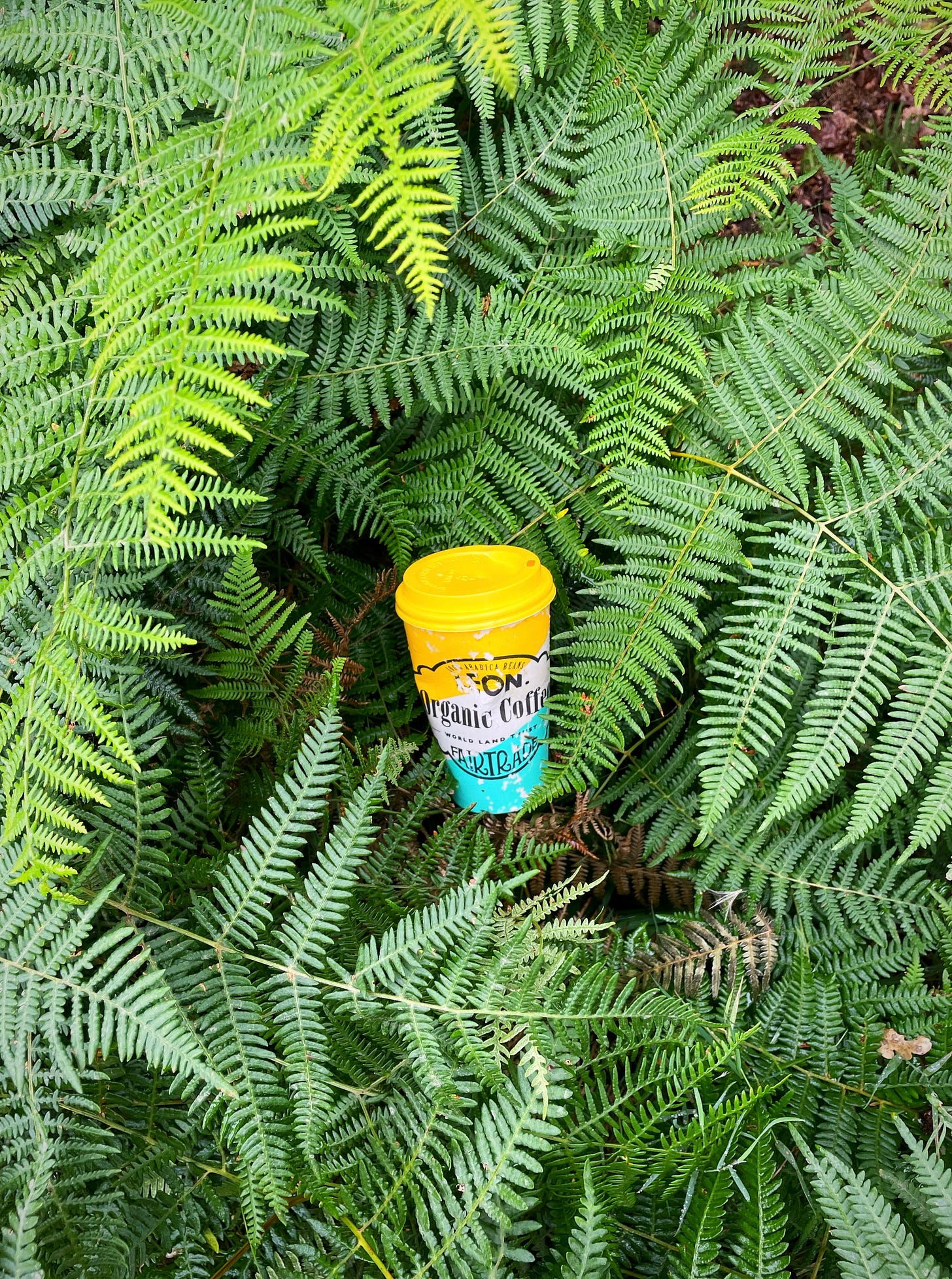
Then on my first ever hike up Pen y Fan, in South Wales, I found this empty water bottle at the summit:
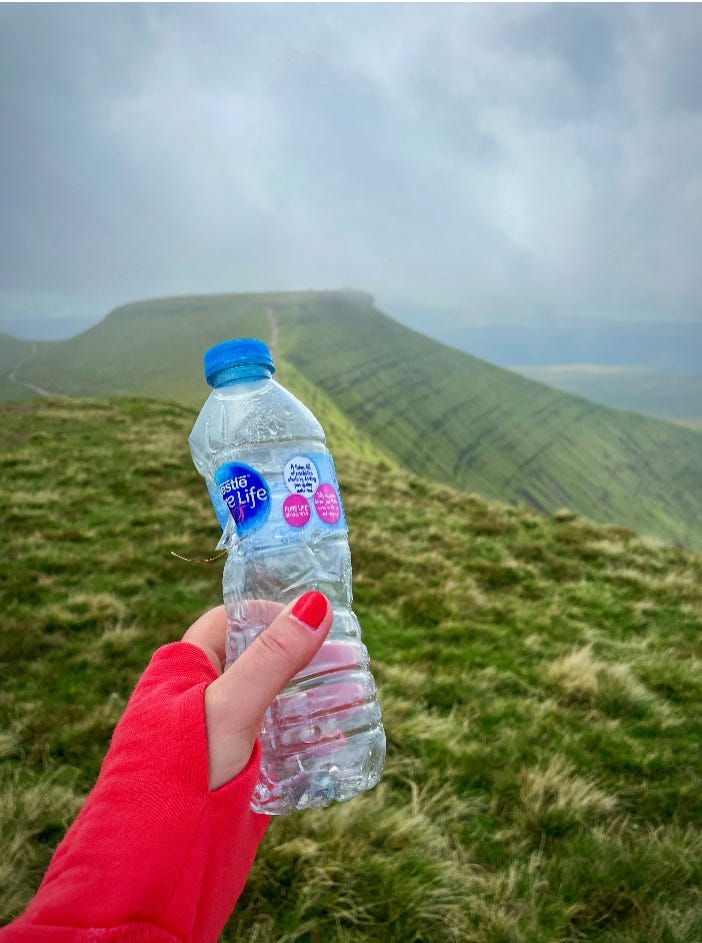
Unfortunately, on some hikes, I’m astounded by the amount of trash I find. A 5-hour walk around The Devil’s Punchbowl in Surrey resulted in these two bags of rubbish – which I then emptied and sorted, putting the contents into the recycling bins, which the National Trust has put outside its cafe and around the car park. In fact, I found more rubbish on that walk than I could carry. I’ve now put more rubbish collection bags in my backpack, together with gloves and a reusable trash bag, so that I have enough with me next time.
But the worst amount of rubbish I’ve seen lately was along a short stretch of the River Bure in Great Yarmouth in Norfolk. I started my walk at Bure Park – a 20-acre open space that borders the River Bure and includes a playground, picnic area, and pitch and putt golf course. The picnic area and car park have bins. Lots of bins.
Very soon into my walk, I found a discarded carrier bag, which I then filled in less than 30 minutes of walking along the riverbank with a variety of trash, including glass and plastic bottles, single use coffee cups, crisps, sweets and ice cream wrappers, and ready-made sandwich containers. Once I finished my walk and was back at the picnic area near the car park, I found even more trash left next to the picnic tables. One of the team who works there saw me collecting the rubbish from the picnic area and directed me to the big commercial bins so I could dispose of the bag I’d filled. We chatted about the trash I’d found alongside the river and he told me it was a big problem, despite the bins the council provides, and he thanked me for helping with the clear up. To be honest, I think he was a bit surprised to see someone clearing away other people’s garbage.
So I invite you to use your walks to help keep our environment free from the rubbish that ruins our views, pollutes our waterways and slowly releases toxins into our landscapes. There are several ways you can do this and here are just a few ideas:
Always carry a bag for collecting rubbish whenever you go for a hike in nature. In fact, carry two: one for the stuff you can recycle and one for stuff that you can’t. You can use bin bags, dog poo bags, re-use old carrier bags or, do what I’ve done, and find a reusable bag. Mine’s a roll-top dry bag that I can rinse out after I’ve used it. But please make sure you do it safely. Gloves, litter pickers and hand sanitiser are all recommended – as is not touching any hazardous materials.
Trash Free Trails, a not-for-profit organisation on a mission to protect our trails and connect people to nature by removing single-use pollution from wild spaces, has some advice on how to collect litter safely.Report any littering and fly-tipping you find on the UK’s streets using the free Love Clean Streets app. The app makes it easy for you to report any environmental concerns, which are then passed to the local (UK) authority responsible for clearing it up.
Take part in organised litter-picking events. There are many small, local groups all around the world who do this, so it’s worth looking for ones near you.
Log how much litter you collect.
In the UK, the charity Keep Britain Tidy was set up to eliminate litter, end waste and improve our shared places. Logging your litter picking helps them understand not only how much litter there is, but also where it’s found and the different types.
And Planet Patrol is an organisation on a similar mission, but with a wider reach than the UK. The data they’ve collected thanks to people contributing to their app and campaigns makes for sobering reading. Here are just a few of the stats from their website:More than two million pieces of litter are dropped every day in the UK each day, costing £663 million annually to clean up
1.3 billion tonnes of plastics is projected to spill out into the environment in the next 20 years globally
Globally, land-origin plastic costs the economy up to $19 billion every year
83% of tap water is contaminated with plastic fibres
There are loads of other organisations – way more than I can cover here – but I hope this gives you an idea of the scale of the problem and the huge number of communities working together to tackle it. If you know any you’d like to share, please do that in the comments.
One last factoid before we dive into the writing. In the UK, dropping litter is an offence and anyone caught doing it faces a fine of up to £2,500. You’d think that’d be a deterrent but it’s clearly not working.
Writing
This time we’re going to turn trash into treasure with a bit of found poetry.
Found poetry is made up of words, phrases, lines and even entire passages borrowed from different sources, such as articles, letters or poems. There are different types of found poetry, including:
Blackout poetry (also called erasure poetry) – the poem is made by taking an entire block or page of text and blacking out the words or lines you don’t want, so that the remaining words form the poem. Here’s a lovely example from poet, Rishi Dastidar
Cento – a poem that’s made by taking lines from various different poems
Cut-up poetry – made by cutting up lines from a single text and then rearranging them to make a poem
Found poetry is a bit like making a collage. I absolutely love it. My favourite approach is cut-up poetry – even when I’m making a cento. There’s something satisfying about cutting out the lines and physically moving the words around until I find an order I like. Here’s a photo to show you how it looks:
So for your writing this time, I invite you to create a cut-up poem using junk mail as the source of your lines. Here are 2 ways to try it:
‘Recycle’ the junk mail posted through your letterbox by cutting out lines of text from them, then playing around with them, moving the lines until you find an order you like. You can then stick them in a scrap book to create your own poetry collection.
Take a digital approach by looking through the spam folder in your inbox, copying lines from junk emails and pasting them into a blank document. Then play around with the lines to see what poetry you can make from them. You could also print out the doc and cut up the lines and play around that way, if you find that more fun.
As always, I’d love to hear how you find the walking and writing, so feel free to comment.
Happy walking and writing,
Sarah
Support The Writer’s Walk
The Writer’s Walk is free to read but not free to produce. If you’ve been inspired by it, please consider leaving a tip on Ko-fi to help me cover the costs.
Liking, commenting on and sharing this edition is also a great way to show your support. Thank you 💚
For any non-scuba divers, a BCD (buoyancy control device) enables a diver to control their position in the water, allowing them to float on the surface of the sea or drift effortlessly underwater. It’s worn alongside adding weights to a belt or special pockets in the BCD to form a ‘buoyancy system’. In simple terms, a BCD is a ‘jacket’ that divers wear, which the scuba tank attaches to at the back. You use the air in the tank to not only breathe, but to inflate the BCD, as needed. They usually come with pockets and various other attachments, depending on the brand and model.
See these 2 sources from the Keep Britain Tidy campaign:
1. Cigarette butts can take 14 years to break apart
2. Bin the butt campaign


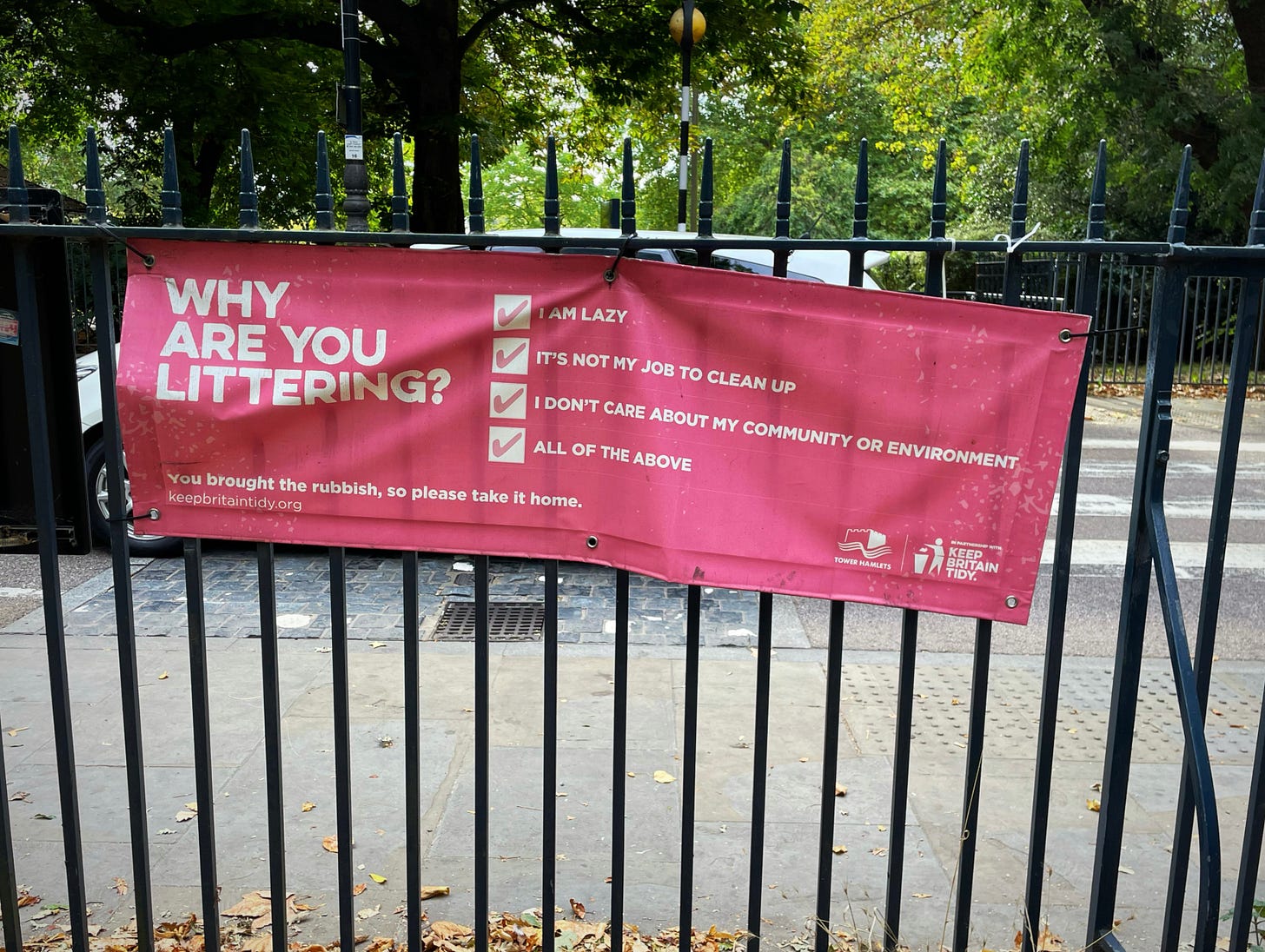
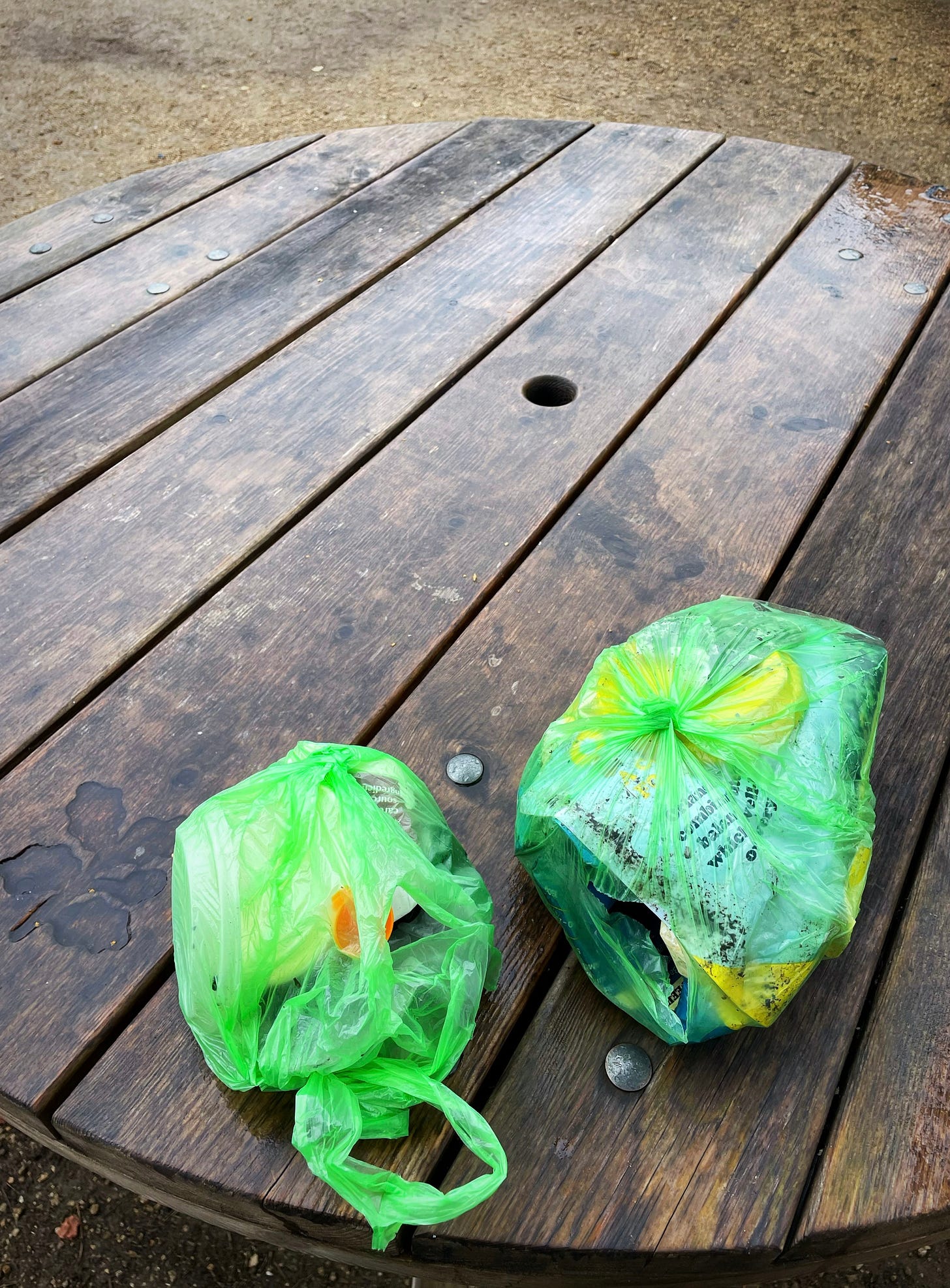
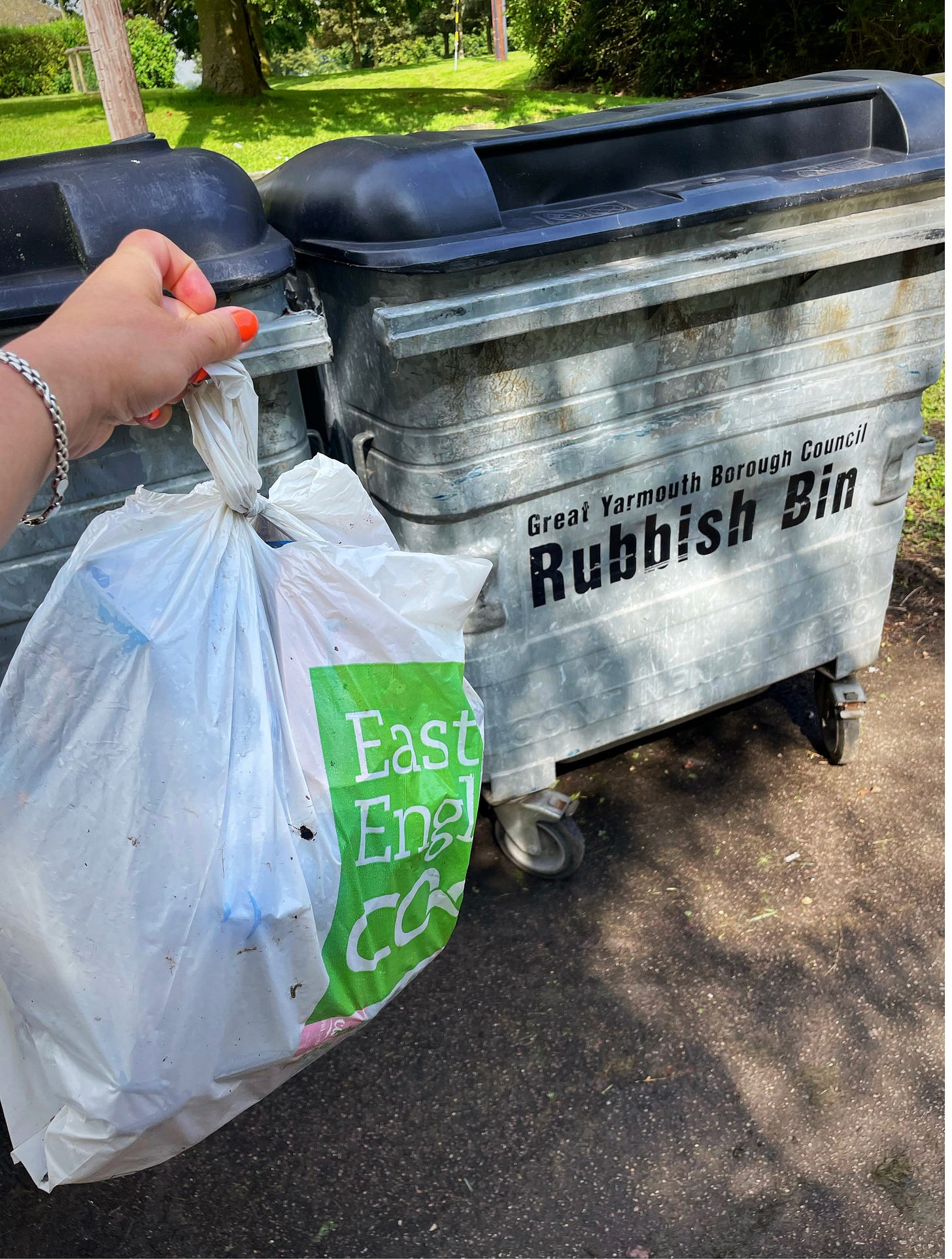
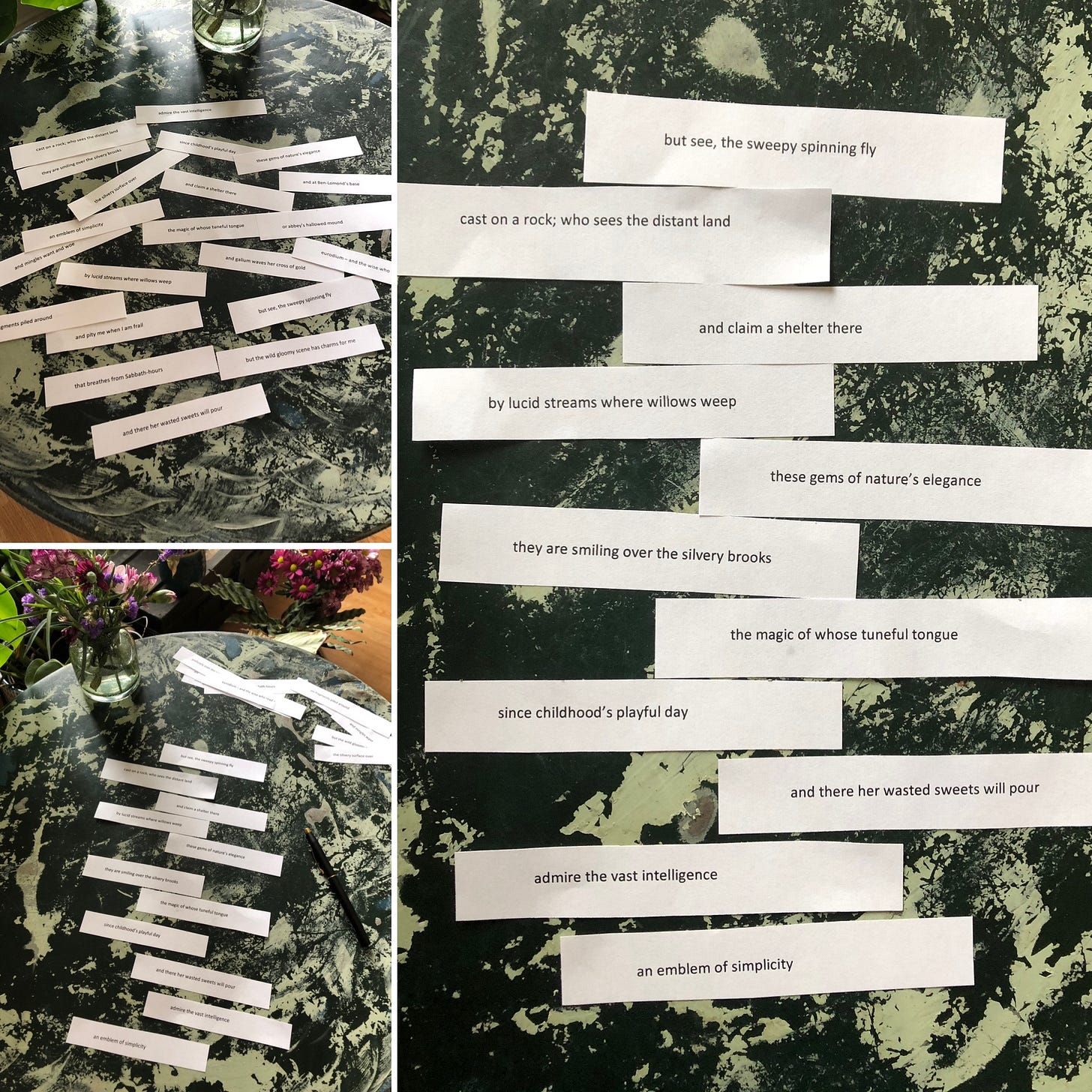
I started regularly picking up litter on our local common (Wadsley & Loxley Common, in Sheffield) during lockdown. Even in what appeared, on the surface, to be uncluttered nature, it's amazing how quickly I could fill an entire bin-bag once I started poking around in the undergrowth.
Now, I live in the most remote part of England, and yet there's rarely a time when I don't come home with something in my pockets (I'm forever forgetting to take a bag, so I now have designated litter-pockets): energy drinks and gels from passing cyclists, vape packaging from the local farmers, sweet and crisp wrappers blown in from far away. A couple of months ago I found a delicate transparent plastic assemblage, which had clearly once been a Peppa Pig foil balloon, worn down to gossamer by months of blowing across heather moorland. I posted it on Instagram, and an artist requested that I send it to them. Can't wait to see what they make of it! Poetry from junk.
https://www.instagram.com/p/C2o9Hu_sbQ3/
https://www.instagram.com/p/C2o9Hu_sbQ3/
A company I did work for has a whole factory devoted to making cellulose acetate, the raw material for cigarette butts. I avoided doing work for that division, essentially a litter factory.
Every trip back confirms that the UK, sadly, remains the litter capital of the western world, although we in the US seem determined to catch up. A train ride through New Jersey a couple of years ago was horrifying.
Even in the environmentally conscious Pacific Northwest, I take a garbage bag on every hike. Plastic water bottles and food wrappers are the most common items, alongside the ubiquitous poo bags that Antonia points out.